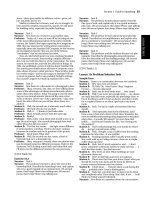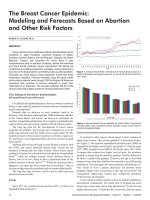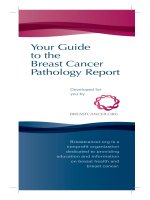Your Guide to the Breast Cancer Pathology Report pptx
Bạn đang xem bản rút gọn của tài liệu. Xem và tải ngay bản đầy đủ của tài liệu tại đây (1.16 MB, 23 trang )
Breastcancer.org is a
nonprofit organization
dedicated to providing
education and information
on breast health and
breast cancer.
Developed for
you by
Your Guide
to the
Breast Cancer
Pathology Report
The pathology report is used by
your doctor to determine which
treatments are right for you.
Your Guide
to the
Breast Cancer
Pathology Report
A report is written each time tissue is
removed from the body to check for
cancer. These are called pathology
reports. Each report has the results
of the studies done on the removed
tissue. The information in these
reports will help you and your
doctors decide on the best treatment
for you.
Reading your pathology report can
be scary and confusing. Different labs
may use different words to describe
the same thing. On page 30, you’ll
find an easy-to-understand word list.
We hope we can help you make sense
of this information so you can get the
best care possible.
TABLE OF CONTENTS
Wait for the Whole Picture
• Waiting for test results 2
• Get all the information you need 3
• Parts of your pathology report 4
Reading Your Pathology Report
• The pathology report answers
questions about a breast abnormality 6
• Is the breast abnormality a cancer? 6
• Is the breast cancer invasive? 7
• How different are the cancer cells
from normal cells? 9
• How big is the cancer? 10
• Has the whole cancer
been removed? 11
• Are there cancer cells in your lymph
channels or blood vessels? 13
• Do the cancer cells have
hormone receptors? 14
• Does the cancer have genes that
affect how the cancer might
be treated? 16
• Genetic testing that is not part of
your pathology report 21
• Are there breast cancer cells in
your lymph nodes? 22
• How many lymph nodes
are involved? 23
• How much cancer is in each
lymph node? 23
• What stage is the breast cancer? 24
— Stage 0 25
— Stage I 25
— Stage II 26
— Stage III 27
— Stage IV 29
Word List 30
Key Questions 34
Pathology Report Checklist 35
Notes 36









